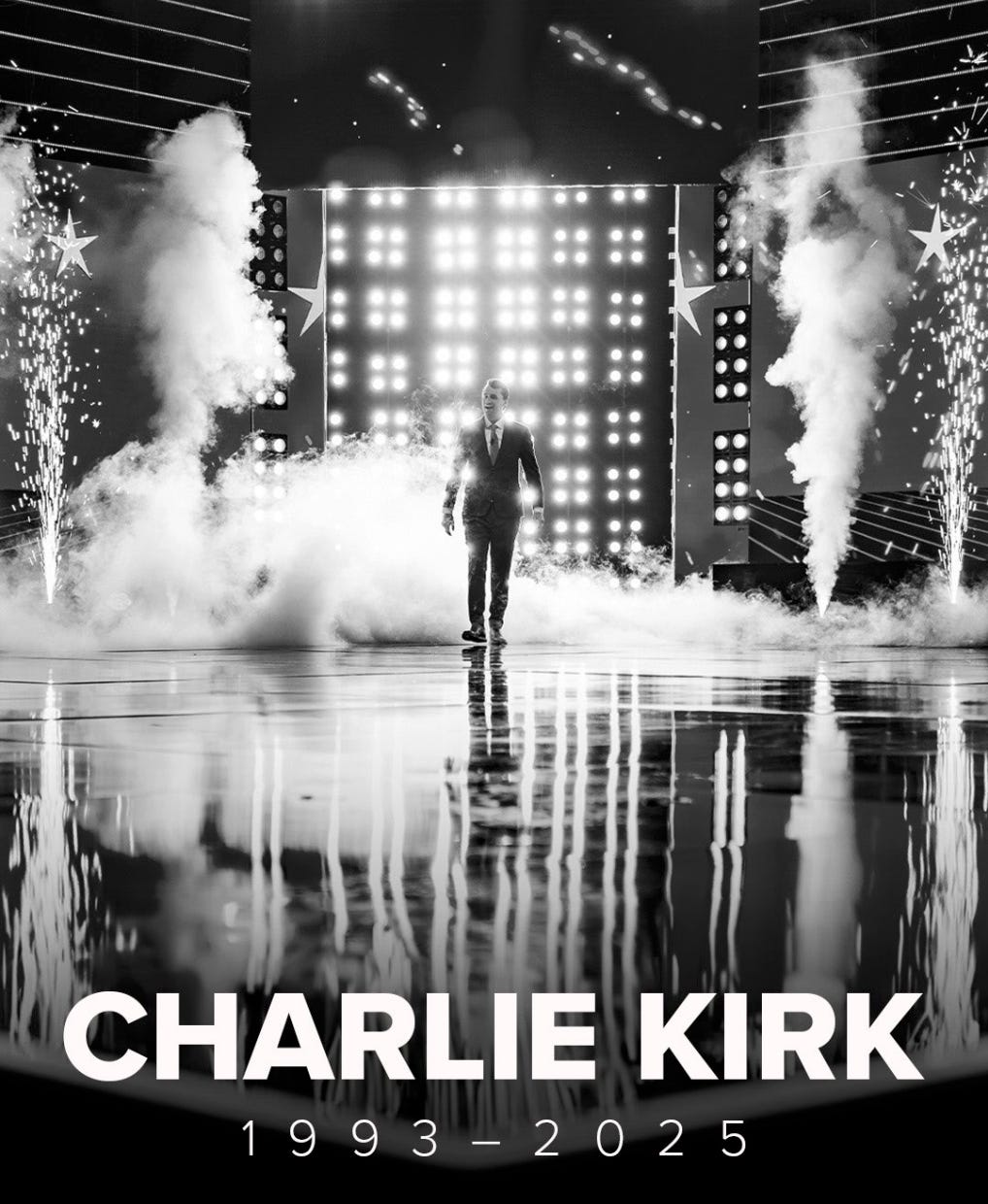The making of a modern martyr
The death of Charlie Kirk
‘You can tell a lot about a person by how they react when someone dies’ - Charlie Kirk
I was in Ireland for a family funeral when I heard the news about Charlie Kirk’s death. Already in a sombre frame of mind, the most difficult thing to stomach was that the 31-year-old political activist had left behind two young children.
I remember when my own were the same age and feeling a sudden, sad shudder about mortality; how they meant absolutely everything to me, the best thing that had ever happened, yet if I died tomorrow… I would end my days thinking of them, and they would never even remember me, my face or my voice.
I was obviously aware of Kirk, but I don’t think I’d ever actually watched his debates - like many others, I’m the wrong demographic. But for many young conservative students, adrift in a notably hostile environment, he obviously meant a huge amount.
And just like many others, I’ve watched a number of Kirk’s debates since his murder, where he always comes across as polite, warm and engaging. I’ve read many testaments to his character, including this moving tribute by US vice-president JD Vance, heartbroken at the loss of a good friend and the suffering of Kirk’s widow and two children.
Kirk clearly loved being a father, and spoke about the thrill of coming home to his little girl in a way that is incredibly relatable as a human being; at some point, at least, his children can treasure that, and think about what might have been.
I heard it said once by a security specialist, that in the case of kidnapping, the best thing to do with one’s captor is to strike up a conversation about your children; if he is also a father, it’s the thing that creates the strongest empathy between two human beings who might otherwise be enemies. It might make it harder for him to kill you when the time comes. (He also suggested that, if he’s not a father, talk about football).
It’s that sense of empathy that allows people to see a fellow human, not just another faceless member of the feared out-group, and it’s clearly something not felt by the many people who cheered Kirk’s death.
I’m not entirely sure how many actively support his murder, or at least felt that he had it coming, but it certainly extends beyond the many online trolls. Among the many who have noticed this, Suzanne Moore wrote how ‘In the hours and days following the murder of Charlie Kirk, this has been a tough exercise for me. For this is the first time, up close, I have seen the kinds of people who would cheer at lynchings, who celebrate murder and who live in a place so twisted that their moral compasses have spun out of control. And some of them I actually know. Some of these people were my friends, or move in the same circles as I do. Most of those excited at the sight of a public execution are young and dumb. But not all of them.’
There have been numerous videos of young people cheering on his death, students saying that he deserved it, or crowds cheering the moronic, gloating words of musicians.
Most notably in Britain, George Abaraonye, the president-elect of the Oxford Union, is still in position despite alleged comments on WhatsApp and Instagram. What made this all the more troubling is that the two men debated each other in May; he had looked Kirk in the face and apparently still reacted like this four months later. Abaraonye, of course, is now the victim.
These, and countless examples in the US itself, have helped fuel a feverish mood on Right-leaning Twitter, fuelled by an increasingly irresponsible Elon Musk, often giving a misleading impression of how Kirk’s political opponents have responded.
In fact, leading figures across the Left have strongly condemned the killing: Bernie Sanders made a speech damning the cowardice of political violence. Left-wing journalists like Cenk Uygur have spoken movingly of former sparring partners, while New York Times columnist Ezra Klein wrote a warm and conciliatory piece about Kirk. The traumatised left-wing activist who was debating Kirk in the moments before his murder expressed his deep and heartfelt sorrow.
Yet it is also true that a significant proportion of left-wingers in the US find some justification for the murder of political opponents, something already made clear by support for the killing of Brian Thompson.
Polling by YouGov suggests that, while 77 per cent of Republicans ‘believe it is always unacceptable to feel joy at the death of someone they oppose’, only 38 per cent of Democrats feel the same. ‘Very liberal’ Americans are also the most in favour of political violence by some margin, although the term is annoyingly inaccurate, signifying progressives, socialists or even communists. Supporting political violence makes you, almost by definition, not a liberal.



